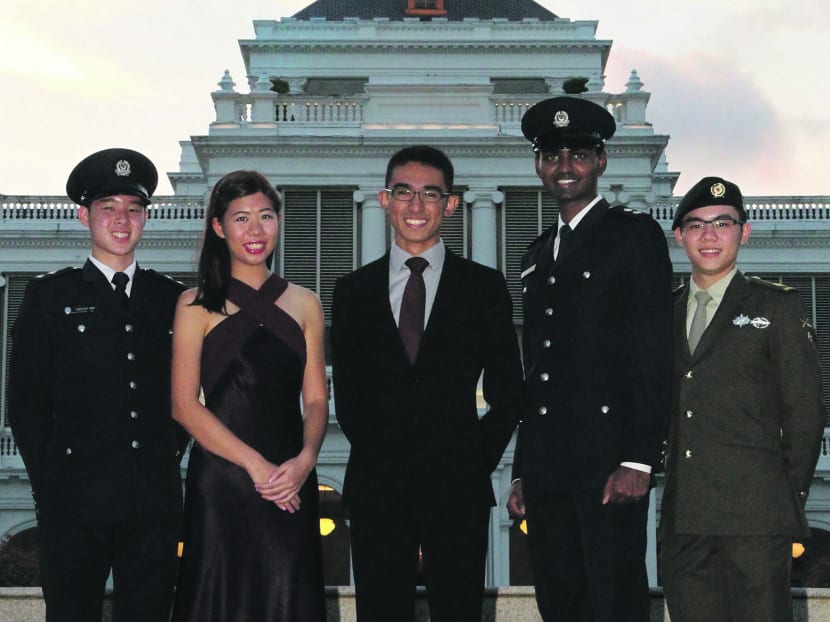Public Service ‘embracing diversity, redefining meritocracy’
SINGAPORE — Citing the fact that the Singapore Sports School produced its first President’s Scholar this year, Public Service Commission Chairman Eddie Teo yesterday detailed its efforts to enhance diversity among public servants to respond to the changing education system, a different make-up of the population and growing complexity of national problems.

(L-R) 2013 President's Scholars Timothy Yap Wei Hang, Stephanie Siow Su Lyn, I Naishad Kai-ren, Joshua Ebenezer Jesudason and Scott Ang Yiqiang photographed at the Istana on Aug 16, 2013. Photo: Don Wong
SINGAPORE — Citing the fact that the Singapore Sports School produced its first President’s Scholar this year, Public Service Commission Chairman Eddie Teo yesterday detailed its efforts to enhance diversity among public servants to respond to the changing education system, a different make-up of the population and growing complexity of national problems.
Reiterating that a decreasing proportion of PSC scholars hail from academic powerhouses Raffles Institution (RI) and Hwa Chong Institution (HCI), the retired top civil servant also spoke at length in an open letter about how the PSC, which oversees the appointment and promotion of key public sector leaders, is “redefining meritocracy” and guarding against elitism — familiar themes leaders, including Prime Minister Lee Hsien Loong and Emeritus Senior Minister Goh Chok Tong, have publicly touched on in recent months.
In 2009, a year after he was appointed, Mr Teo wrote an open letter which focused on the PSC interview process to help applicants understand what kind of candidates it was looking for. In his letter published yesterday on PSC’s website, Mr Teo said it was “timely” for him to issue another one, “with a message for a broader audience”, as he embarks on his second term. Having interviewed thousands of top students and having interacted with members of the public, “my colleagues and I felt that the PSC needs to explain its recruitment role further”, he wrote.
Among other things, he pointed out that a diverse Public Service is needed to “avoid ‘groupthink’ and to appreciate the needs of a diverse Singapore population”.
Mr Teo also said that the PSC is “acutely conscious” of the need to have public servants coming from all socio-economic classes, “lest we end up breeding a class of elitist public servants who lack empathy”.
He stressed that “superior policy-formulating skills” alone, for instance, are not enough. “Public servants now need to engage and consult the public and communicate government policies effectively,” he said.
He noted the shift in the education system, which has recognised the need to produce students with holistic abilities “rather than only those who are exam-smart”. Similarly, the PSC has moved away from “the early days” where the tilt was in favour of awarding scholarships to those who scored well in exams, he said.
Over the last two years, the percentage of PSC scholars from RI and HCI has gone down to 60 per cent, compared to an average of 68 per cent over the last decade. The proportion peaked at 82 per cent in 2007.
Mr Teo said that students from junior colleges such as Pioneer, St Andrew’s and Nanyang “are also starting to receive scholarships”. “They no longer rule themselves out from applying, on the mistaken belief that they have no chance,” he said.
Among the batch of President’s Scholars this year was Scott Ang, 20 — the first student from the Singapore Sports School to be awarded the honour.
Mr Teo pointed out that more schools are being represented among the candidates interviewed by the PSC for scholarships in general “because all schools are getting better and more students are willing to choose them”. “Students choose to study in the School of the Arts and the Sports School not because they cannot study, but because they have different interests,” he said.
Apart from selecting scholars from a variety of backgrounds and schools, the PSC also encourages scholarship applicants to consider studying in “non-traditional” countries and in different universities, “rather than only well-known Ivy League universities or Oxbridge”.
However, over the last decade, only about seven per cent of PSC scholars studied outside the United States, United Kingdom or Singapore. “Those aspiring to be public servants should realise that their performance will often be enhanced if they can bring a new perspective ... gained by their stint in a ‘non-traditional’ university or ‘non-traditional’ country,” Mr Teo noted.
Political analysts said that Mr Teo’s comments further reinforced a changing mindset within the Government where a premium is now placed on public service and political leaders who are “more grounded, less elitist” and better equipped with ‘soft values’ such as empathy, as National University of Singapore political scientist Bilveer Singh put it.
Singapore Management University Associate Professor Eugene Tan added: “Change will be most prominent at the entry level through the scholarship selection process but the change must work its way up the leadership chain and reinforced down the chain of command.”









